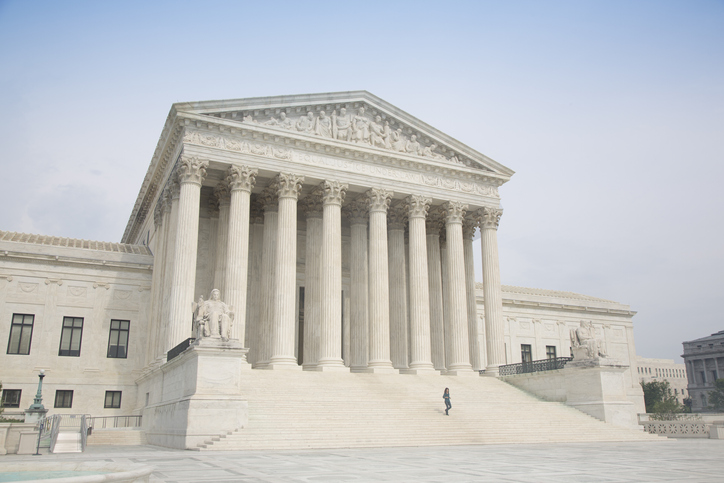The U.S. Supreme Court has thrown out an appeal court ruling in a controversial case involving activist DeRay McKesson, the Black Lives Matter organization and a Louisiana police officer.
The case revolves around a Baton Rouge, Louisiana, protest organized by McKesson, a known leader of Black Lives Matter, after the police killing of Alton Sterling in 2016.
The July 2016 protest was held outside of a police station and as people were being arrested, an unnamed officer was hit with a piece of concrete or brick by someone at the protest who was never identified. The officer sued McKesson, Black Lives Matter Network, Inc. and #BlackLivesMatter after he "suffered devastating injuries in the line of duty, including loss of teeth and brain trauma," according to the Supreme Court.
McKesson's lawyers, including ones from the American Civil Liberties Union (ACLU), argued that making protest leaders culpable for the actions of singular, unknown protest participants would have a chilling effect on protests and free speech, forcing activist groups to devote significant funds toward covering potential legal costs.
A federal court sided with McKesson and Black Lives Matter in 2017, ruling that neither could be sued for the incident. But the 5th U.S. Circuit Court of Appeals in New Orleans backed the officer in his appeal, saying McKesson was liable but not the Black Lives Matter group. The court wrote that “a violent confrontation with a police officer was a foreseeable effect of negligently directing a protest,” according to CNBC.
In the 7-1 Supreme Court decision released on Monday, only Justice Clarence Thomas dissented and newly appointed Justice Amy Coney Barrett did not rule in the case, according to the Supreme Court document. They shot down the appeal court ruling and sent the case back to the Louisiana Supreme Court.
The Supreme Court blocked a lawsuit by police against activist DeRay Mckesson.
A police officer sued over his injuries from a 2016 #BlackLivesMatter protest Mckesson organized. Civil rights groups say letting protest organizers be sued for actions of others is unconstitutional. pic.twitter.com/4rdqECku0f
— AJ+ (@ajplus) November 2, 2020
The 5th U.S. Circuit Court of Appeals argued that a jury should decide whether McKesson is liable but the Supreme Court invalidated that opinion and sent it back to the same court, asking that they get input from the Louisiana Supreme Court.
"The Louisiana Supreme Court, to be sure, may announce the same duty as the Fifth Circuit. But under the unusual circumstances we confront here, we conclude that the Fifth Circuit should not have ventured into so uncertain an area of tort law—one laden with value judgments and fraught with implications for First Amendment rights—without first seeking guidance on potentially controlling Louisiana law from the Louisiana Supreme Court," the ruling stated.
"We express no opinion on the propriety of the Fifth Circuit certifying or resolving on its own any other issues of state law that the parties may raise on remand," the ruling added.
In a series of tweets, McKesson criticized Thomas for being the lone vote against him and thanked the ACLU for their work.
"Clarence Thomas is just not on the right side of any of these issues," McKesson wrote.
I'm incredibly thankful to the ACLU Legal Team and David Goldberg for their representation. This would've been impossible without them. And it's not over — the Supreme Court has sent the case to the Louisiana Supreme Court to answer another question. Let's see how that goes.
— deray (@deray) November 2, 2020
In a statement to CNN, ACLU National Legal Director David Cole said The Supreme Court "has long recognized that peaceful protesters cannot be held liable for the unintended, unlawful actions of others."
"If the law had allowed anyone to sue leaders of social justice movements over the violent actions of others, there would have been no Civil Rights Movement. The lower court's ruling is a threat to the First Amendment rights of millions of Americans," Cole told CNN after representing McKesson in the case.
Lawyers for the police officer took the opposite view in an interview with CNN, saying that while the First Amendment does protect protest, those organizing demonstrations should face consequences if violence occurs.
"What is at stake here is not the officer's right to seek redress for his injuries, but the First Amendment rights of organizers to use protest to express political and social views," a group of First Amendment lawyers represented by Acting Solicitor General Walter Dellinger told The Supreme Court, according to CNN.
Experts with SCOTUS blog explained that the crux of the case is whether McKesson can be held liable under Louisiana law, specifically. The Supreme Court noted that in Louisiana law, there is generally no such thing as a duty “to protect others from the criminal activities of” others, which is what the officers lawyers are arguing.
Despite the win, attorney for the officer, Donna Grodner, told CNBC that the case was only thrown out on technicalities and that ruling actually signified that the 5th U.S. Circuit Court of Appeals "got it right."
